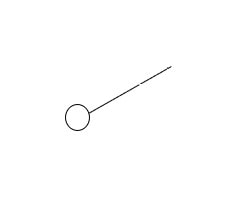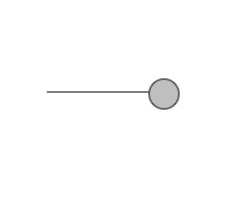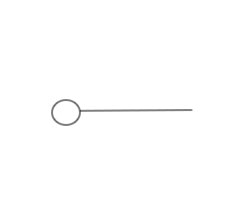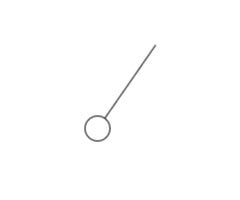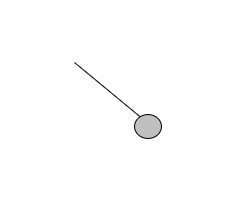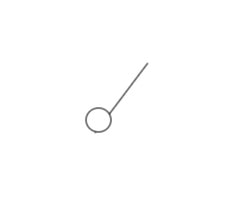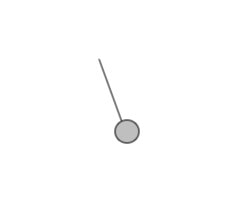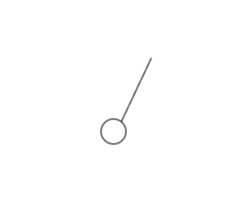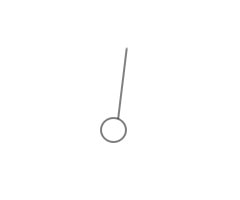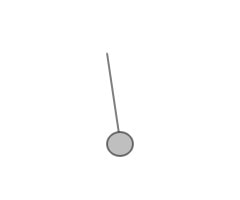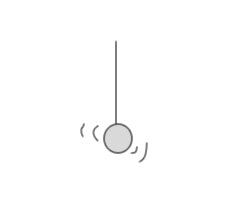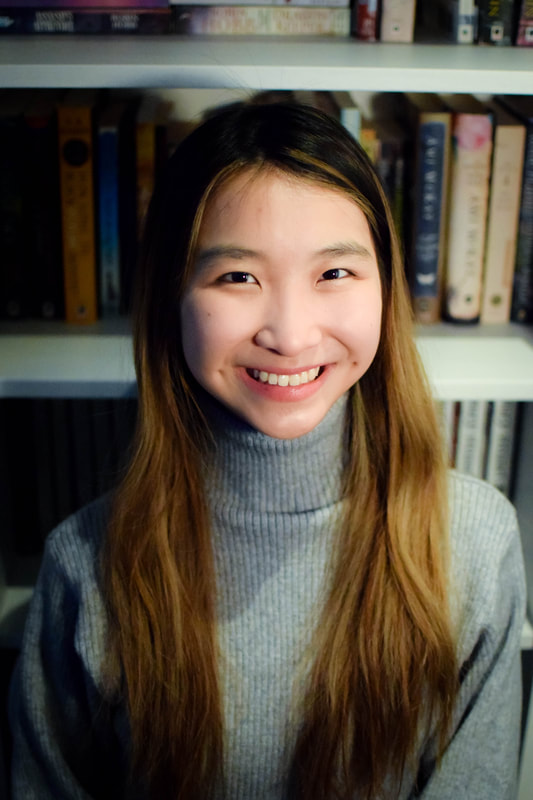Pendulum
|
|
Content Warning: references to depression and self-harm
My grandmother massages my fingers. The rain falls around us. Symphonies.
I don’t need to wash my hands today, I say. She laughs. Her skin glows under the pale-pink hat and wine parka. When we eat at the wooden table, chopsticks clicking against tin plates and paper cups, she tells my father and mother this story. Because of the rain? my father asks. He stoops low over his blue-feathered embroidered bowl, thinking to himself. It isn’t until later in my life that he starts paying attention to what’s being said. I squirm in my seat, point at the pile of si jap pai gwak. Does this have any bones in it? Here you go, my grandmother says. She picks up exactly what I don’t want—a flabby piece of meat with barely any juice. But I— It falls safely into my bowl. Eat more, mother says in a flat tone. Your brother will catch up to you. I pick up my chopsticks and stab into the meat. Joshua chomps on the fish my mother feeds him by a half-full spoon, flesh she’s delicately fumbled through with her mouth. My father thumbs through his phone. Today is the last day of many days, because my grandmother will leave for China tomorrow. Later that night, the bed squeaks when I flop onto the bed. My grandmother tells me that our house creaks with the weight of our family’s secrets and histories. But, she murmurs, our old home in China—the one you were born in—that one sings even more. I’ll miss you, I say. When are you coming back? Soon, she says. Take care of your brother for me. I pull her closer. Her hand pats the back of my head in steady rhythm. The pills clatter onto the floor, begging to be held. I poke them with my foot, the smooth, rolling sensations dissipating into the dust with each push. A painting of Buddha hangs on the wall—I wish I was a tiny version of them. Endless, timeless, spiritual. Reincarnation would be real, then. I dangle my finger over the sink. My hand buzzes; it’s the first time today I’ve felt buoyed from dark melodramatic harmonies.
When the phone rings, I opt for a text message instead: busy atm call back later u have notes from class? yeah send 2 me l8er ok I place my phone on the cool edges of the stove and watch it unbalance itself. Gold bumps against black bumps against white. I stretch my arm out and touch the screen. Another text glows: we call home on Skype today. I clutch her cotton pajama shirt, safely enclosed in her lap. The flashing silver machine is fascinating but my fingers can’t break through the veil of her thick strands of hair.
Hiu means the dawn, because you’re born in the morning, she whispers as she works. Yellow thread passes through the mouth and ties itself together in smart ribbons. And Mun means knowledge. You will have a lot of that in the future. She presses the red material down, then circles it again. Are you excited? she asks. It’s almost your mun seui. I giggle. Ma Ma— Beaming, she brushes off the straying threads and places the silk on my chest. There—perfect. Sometimes the phone calls last for hours, sometimes, I offer a quick “Sun neen fai lok, Ma Ma!” through voice memos. But what I don’t do anymore is slip on my keipo and dance while weaving a silent harp. Even while singing, I remain still as a memorial statue, waiting for my coat of paint to flake away.
Hou, she says, after I finish my Chuán Qí song. Her hands rest on her lap as she tilts forward; the weight of her head has doubled since we first started. She gulps in air through her mouth. Alright, my uncle says, peering into the webcam. That’s enough for today. Yeah, my father murmurs. He draped a cloak across my grandmother’s shoulders the day she left Canada—at the boarding gate, just before they scanned her passport, he slid out a gift wrapped in plastic. The way he looks at the screen now is the same as the moment he settled the cloak across my grandmother’s shoulders, and knelt down, tying it close. Joshua, my mother calls. Come say goodnight! My brother gives a salute from his repose on the piano bench, one for each syllable. Good. Night. They can’t see you. That’s the point, he mutters, but plops down at the chair and waves. Happy Chinese New Year. Hope it’s full of—bananas? No, um. Bread? Fish, I say. Oh, yeah. May your day be full of fish. Okay guys, my mother says. It’s off to bed. As my father presses the Leave Session button, the on-screen image freezes; my grandmother touching her chin lost in thought, my uncle with one hand guiding her off the chair. The pills I take every night to mitigate the blues: I nickname them Aurora, short for a compound of oxalate. Summertime filters through the glass. My mother hums Jacky Cheung in the kitchen, snapping her wrist over the black non-stick pan.
You better be hungry. ok It’s a joke. my bad She knees the knife drawer shut with a bang. Well? she asks. Are you going to eat that banana? … i don’t know I’ll have it then. I press the screen and attract candies to my thumb. I look up, but she’s already turned away. I notice a thought, and write it down for my therapy session this Thursday: how do I remember the color of my mother’s eyes. We visit China in the summer of Grade 10. My brother proclaims the best tourist location is the Běijīng hotel with air conditioning. I half-agree, if only because I prefer non-squat toilets. My father curls his tourist map underneath his arm, a mountain-climbing bag loosely covering his torso and upper thighs. My mother dawdles behind, her legs too short to keep up with his bounding steps.
Look—over there—that’s where we got our food coupons in the mornings. And you see that—that’s the University I went to. We can visit it later. Let’s go, we don’t have time. Let’s take the train to Sìchuān, too. But I don’t know if we can all handle the spicy food— Dad, when are we going back to Běijīng? Dad, you’re going too fast. Mom’s way behind us. His smile looks genuine, but he still clutches a crushed napkin in his fist. The blood dries quicker out here compared to in my grandmother’s apartment, where we are all strangers barricading ourselves from helpless fear, as we watch her drag one leg behind her, ashes trailing her feet. My father has taken precautions to photograph us in different poses next to my uncle and my grandmother, my grandfather and my grandmother, my grandmother and her favorite Buddha statue. Dad, when are we going back? I ask. He pauses. Not right now, okay? I have a lot I want to show you guys. Can we go somewhere with air conditioning? Joshua scowls, kicking the toe of his shoe into the sidewalk. Fine. Where’s your mother? I squint my eyes, then point at the small figure in white, near the edge of the square. I think she’s talking to someone. Wait here, my father says, jogging through the crowd to reach her. She’s about to wave good bye, but he grips her wrist inside his hand, dragging her forward. When they finally catch up to us, my mother is bending over and puffing for breath. That was good exercise, she says in between coughs. I needed that. Noodles, Joshua announces. Let’s have noodles for lunch. I’m fine with anything, I say. Okay, my father says. Noodles it is. My short-term counselor tells me that parents aren’t perfect.
Sometimes, they want to be a good person but they don’t have the right execution, she explains. I stifle a joke. We all have a child inside ourselves, she continues. My iPhone screen whirs with heat, working double-time to compensate for the closed window in mid-summer. What does the little girl in you need? I don’t know, I say. Try to guide her, nurture her needs. I nod. And take a breather, she says. Walk outside for a bit. That will help the medicine go down easier. Off-screen, the pills rattle in their blue crib. Sure, I say. They could use a break. Our kitchen table wobbles as I shift onto the chair. Incense drifts onto the screen, and my uncle waves it away from my grandmother’s face. I clutch the imaginary pill in my hand, crush it, and gulp it down.
Mother is off-screen wiping her tears into a napkin; Joshua sips his orange juice from a straw, the plastic container clutched tightly between his knees. Hello, I say, angling my eyes into the camera. I missed you. Mun—she creaks, looking at my father. Her eyes are hazy in the fog. She smiles. Mun. Hiu Mun. Do you want to hear me sing? I clear my throat. I can also recite some poetry—? Hiu Mun, my grandmother says, pointing to my uncle sitting next to her. No, I’m Pin Long, he says, his voice trembling. You just remember her, don’t you? Sorry, I mumble. Just sing, my father says, hunching over the laptop, gazing into the video. Later I will realize he is memorizing her. She’ll be happy with anything. When the time comes, they don’t dress her in black, like in Canada. We will bury our own our way, my father says. He curls over his suitcase, a snail in his shell, stuffing in some threadbare jackets and jeans. I’ll be back soon.
Okay. The ground pulls my feet into the hollow wood. The Buddha poster grins in the shuttered sunlight. Some mornings, I freeze up inside and can hardly move. It must be a by-product of my bedroom windows. They’re stale, covered with the mucus of past lives, people who’ve tumbled past this place, breathed, put up posters, and moved on. The glass holds the lingering vibrations of those who were already on their way.
I grab my coat and head downstairs. Where are you going? I face away from her, wave the back of my hand. i’ll be back The door unlocks, shivers, then shuts the world out. Everything is quiet these days, no shush of fall leaves as they’re being gathered into the arms of something warm, no blower tunneling through the thick silence. I would’ve preferred to walk past a mini-tornado, stood in the midst of its swirling, and felt it rattling against my shoelaces. Footsteps echo behind me. I turn. Light shines off her pink parka. what are you doing Let’s go together. I have to go to No Frills anyways. don’t touch me She laughs. It’s pretty warm today. My fingers are stiff in my pockets. I tower over her, so I can see her strands of white rippling. Her neck rises straight from her shoulder blades like an incense offering. Your father’s coming home tomorrow. i know How’s school? okay Her words drift into the snow banks, weighed down by the wind that snaps and pierces through the cable lines. I lean down and gather snow into my hand. The burn entices my fingers to wriggle. The intersection comes into view. —and why don’t I teach you T'ai chi? I learned from the best. i’ll see you later I bound towards the park. I am guilty for so many things, and yet, I cannot relinquish the layers I’ve already cultivated to save myself. Somewhere inside, the little girl cries with fear. She cowers into screens to leave behind the booming doors, the screaming, her physical body, the solitary nights, the apologies, the make-ups, the periods of peace, the innocent catalysts, the guilt-tripping, the anguish, the We comfort each other. I’ll protect you. I won’t let her hurt you again. I glance up, snowflakes thickening on my cheeks. Somewhere overhead, my father carries home the weight of my grandmother’s love. My grandmother is pressed against the white sheet, her skin flaking with bits of golden vitality. My uncle cries through the picture. I am numb. I should cry but I cannot.
She remembered you, my father says. Even at the end. When I don’t answer him, he continues. She didn’t know any other name but yours, yours and a few others— I don’t interrupt him. It comforts him—thinking that the person who remembered my name was the one who taught him how to walk, how to boil rice and ration food coupons. She lives in you, he finishes. His face flushes as if he’s just sipped on wine. Do you want some water? I ask. He doesn’t respond. I wait. Yes, that would be nice. Okay. I’ll grab a glass from the kitchen. He nods. I close the door softly. The room shuffles, hiccups, shivers behind me. My mother meets me at the bottom of the stairs, her eyes puffy. Is he okay? he’s alright, I say. but he wants a glass of water I’ll get it for him. okay She pauses, turns back around. Are you okay? I tilt my head. The little girl screams. She is nestled inside infinite layers of padding, protected. She doesn’t want this woman to touch her with warm nails and freezing tongue. yes, I say. She leaves the kitchen with two cups of water. Here you go. thanks I stare into the glass, my reflection fragmented by a coating of ice. I gulp the liquid down. The stairs creak. I stare out the sa cheung, branches of weeping willows drifting onto the lawn. Joshua whacks a soccer ball across the lawn with a stick. He sees me and salutes. Wind rustles at the nape of my neck. Mun. Hiu Mun. I startle, glance towards the landing. A pair of pale toes enclosed by pink slippers. Thick, padded fleece sweatpants. A green vest, unironed. The little girl sobs into her blanket. Shh. It’ll be alright, I say, embracing her. We are just looking. There are no promises being made. Hiu Mun. My grandmother’s voice sings in the cracks of the walls, in the concrete worn down over two decades of fumbling up and down staircases, in the house still vibrating with her breathing. My eyes follow my mother’s shoulders, up to her neck, her jaw, out of a foreign need, out of a tiny seed blooming in my stomach. I won’t forgive you, the little girl snarls. I will never forgive you. I pause at the top of my mother’s lips. I twist my fingers into my palm. Nothing comes out, not even blood. Vivian Li is a writer, editor, and musician who enjoys exploring various artistic disciplines. Her creative work can be found in Uncanny Magazine, ellipsis… literature & art, and Plenitude Magazine, among others. She was Longlisted for the Commonwealth Short Story Prize 2020 and received Honorable Mentions from Muriel’s Journey Poetry Prize 2019. A MFA candidate at UBC, she currently edits for Augur, and can be reached @eliktherain.
|

